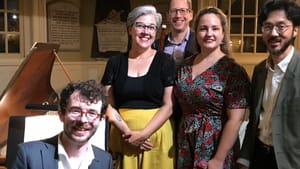Stay in the Loop
BSR publishes on a weekly schedule, with an email newsletter every Wednesday and Thursday morning. There’s no paywall, and subscribing is always free.
The Music and Death of Major John André
Philly Fringe 2025: Publick Pleasure presents Sympathy Towards a Soldier

Part of this year’s Philadelphia Fringe Festival, Publick Pleasure’s Sympathy Towards a Soldier, subtitled The Music and Death of Major John André, offered a unique slant on colonial Philadelphia.
John André (1750-1780), a major in the British Army from 1770 to 1780, fought in the battles of Brandywine and Germantown and in the 1777 conflict that captured Philadelphia. During his nine-month tenure in the British-occupied city, André became a Loyalist society favorite. Charming and lively—fluent in French, German, and Italian—he drew, painted, wrote verse, and was an accomplished flutist who sang and composed. But he had a secret life.
Have a little sympathy
While living in the house of Benjamin Franklin (who was in France), André was the head of British intelligence operations in America. In league with Benedict Arnold and ultimately arrested for espionage, he was executed in 1780 by order of George Washington. Major André begged Washington for "sympathy towards a soldier" and asked for death by firing squad. His request was denied, and he was hanged.
Presented at historic Gloria Dei (Old Swedes’ Church), the Publick Pleasure’s musical evening also included spoken word. Its four sections—The Comeliness of Spring, The Blessedness of Summer, The Fall Declares Against You, and The Winter Feels Your Loss—were each introduced by a historical excerpt from colonial letters and newspapers, read by cellist and ensemble founder Eve Miller. The first dealt with André’s youth and London life; the second, his arrival in America with the British Army; and the third with his capture. The evening concluded by considering André’s trial and death.
Music by composers of the age—James Oswald, Carl Friedrich Abel, Johann Christian Bach, James Hewitt, and André himself—was offered alongside traditional ballads and dances. The ensemble’s five accomplished musicians (playing period instruments and grounded by Miller’s cello) expertly recreated the atmosphere of the British occupation and its musical intersection with the arc of André’s short career.
The pleasure of sound
The flute (Major André’s instrument) was prominent throughout, and the evening opened with the eloquent playing of flutist Steven Zohn in Oswald’s work The Cowslip, one of the composer’s seasonal “floral miniatures” that opened each section.
Soprano Anika Kildegaard sang period selections (some a cappella), including the rousing 1778 British ballad The Rebels (skewering colonial soldiers for their “hunting shirts and rifle guns”); Brave Paulding and the Spy (sung to the traditional tune of Barbara Allen); Major André’s Complaint (written by—who else?—André); and the concert’s penultimate offering, the haunting dirge, Small Is the Spot of Earth.
A rendition of God Save the King (1745 version), encouraging the audience to sing along, morphed into harpsichord variations on the tune by Johann Christian Bach, played by harpsichordist John Walthausen, who provided expert continuo throughout. A particular delight was Hewitt’s variations on Yankee Doodle Dandy, which Walthausen played with virtuosity, martial glee, and deadpan humor.
Another highlight was a set of five country dances favored by the British and their supporters during the occupation’s social events. Including works like Lady George Murphy’s Reel and Lady Louisa Lenox’s Minuet, these were played with wit and gusto by violinist Francis Liu and cellist Miller.
The concert concluded somberly with a reading of André’s heartbreaking appeal to Washington and a flute solo (The Black Joke, a reprise of The Rebels theme) played elegiacally by Zohn from the church’s upper back gallery, enhanced by both the church’s 325-year history and its redolent acoustics.
In October 2022, Miller had organized a concert titled The Publick Pleasure, exploring how the “gigging lives” of colonial Philadelphia musicians paralleled those of today. The warm reception to that offering inspired the highly regarded cellist to found this ensemble, suffusing music with history in a welcome addition to the city’s concert scene.
What, When, Where
Sympathy Towards a Soldier: The Music and Death of Major John André. Anika Kildegaard, voice; Francis Liu, violin; Eve Miller, cello; John Walthausen, harpsichord; and Steven Zohn, flute. Publick Pleasure. September 19, 2025, at Gloria Dei (Old Swedes’) Church, 916 S Swanson Street, Philadelphia. (215) 413-1318 or phillyfringe.org.
Accessibility
The Gloria Dei (Old Swedes’) Church has shallow steps leading into the building and a small on-site parking lot. Concerts are held on the church’s first floor.
The church is accessible via public transportation.
Sign up for our newsletter
All of the week's new articles, all in one place. Sign up for the free weekly BSR newsletters, and don't miss a conversation.

 Gail Obenreder
Gail Obenreder